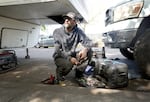The residents of a homeless encampment on Southeast Clackamas Road have been preparing themselves. Last week, people organized belongings, tried to pick up trash and attempted to repair their recreational vehicles. Some debated where they could find parts to get their RVs running in time.
And time is not on their side. They’re preparing for the morning of Sept. 30, when deputies from the Clackamas County Sheriff’s Office are planning to force them to leave, clearing the camp before officials permanently close the road.
The clearing of the camp — the largest of its kind in the county, according to some county officials — is the culmination of local efforts to crack down on encampments that can result in large amounts of trash and derelict vehicles. At the same time, it also highlights a dearth of immediate services available for people experiencing homelessness in Clackamas County.

Phil Wheeler repairs his pick-up ahead of him having to leave an encampment on Clackamas Road on Sept. 20, 2024.
Joni Land / OPB
People have been living on this stretch of Clackamas Road, either in tents or RVs, for around two years. The total population has fluctuated in that time, ranging from a handful of people to a couple dozen.
The camps have always attracted negative attention, particularly due to the piles of garbage that have cropped up in the past. The county has organized multiple trash cleaning events, and has successfully housed some people in years past. Yet people continue to park RVs on the street.
“It was kind of heartbreaking to go back out there, and it looked like we hadn’t even done anything,” said Clackamas County Assistant District Attorney Bill Stewart to commissioners at a county meeting in July.
The plan for Monday is fairly straightforward: The county will clear the camp and remove any leftover RVs and garbage. After that, a gate will be constructed and the street will be closed to the public.
Then, at an unspecified time, ownership of the road will transfer to the neighboring businesses, KB Recycling and Conveyco Manufacturing. At that point it will become a private road, through a process called a road vacation.
It’s an unusual process for removing a camp, but one the county argues is necessary to prevent the encampment from returning, as it’s done in the past.
“We all realized the most expeditious path forward was the option of gating it,” Clackamas County Assistant Transportation Director Mike Bezner said in the July meeting.
Some commissioners focused on the perceived criminal nature of the camps, in particular alleged drug use and vandalism.
“When I drove by there, it seemed like there was a certain population that was ripe to spend some time behind bars, to maybe have a different type of intervention than a nice handshake,” Commissioner Ben West said at the time.

Phil Wheeler and his dog, Nico, outside his RV in Clackamas County, Ore. on Sept. 20, 2024.
Joni Land / OPB
Commissioner Paul Savas cast the only vote against the decision to gate the road. He said he shared many concerns about the safety of the camps, but felt the process went too fast and needed more discussion.
In particular, he worried that anyone removed from the camp would reappear in a different part of the county.
“I am certainly concerned about them just simply relocating into another street or part of the county until we have some of those facilities in place,” Savas said in an interview with OPB. “I have no indication that my concerns have been alleviated.”
Nowhere to go
Phil Wheeler and his wife have lived in their RV on Clackamas Road for about two months. They are originally from Lincoln County and have bounced around Oregon looking for places to park their vehicles undisturbed.
Wheeler doesn’t know where they will go after this encampment is cleared. Everywhere they have been before has resulted in them being forced to leave, making it difficult to maintain his construction job.
“I’ve not been anywhere, even a rest area that they didn’t kick us out of by two o’clock in the afternoon,” Wheeler said. “That’s why I came over the hill, because they don’t do that here.”
That appears to be changing. The clearing comes nearly three months after the U.S. Supreme Court’s decision in Grants Pass v. Johnson, which allows local governments more options for removing and citing people who live outside.

Multiple vehicles are parked on Southeast Clackamas Road, the largest homeless encampment in Clackamas County, on Sept. 20, 2024. The local sheriff's office is clearing the camp on Sept. 30.
Joni Land / OPB
Since then, clearing of encampments in cities like Portland has become more frequent. But unlike Multnomah County, Clackamas County lacks many of the same sheltering options for recently displaced people.
Brandi Johnson is the director for local nonprofit Love One Community, which assists people living on the street in Clackamas. She said service providers can try to connect the residents to family in the area who can help them, or provide them a gas card to get them somewhere to seek help. But when it comes to immediate sheltering options, there’s not much they can do.
Clackamas County, with more than 400,000 residents, has no congregant overnight shelter. Various programs for transitional housing are either used up or have yearslong waitlists with hundreds of applicants.
“It is really challenging to come up with resources for folks, for places to go,” Johnson said. “That is absolutely something we want to work on and make a change in here. But until then, it’s pretty challenging.”
A ‘push pull’ approach to homelessness
This year has also seen Clackamas County increase its enforcement on RVs illegally camping on public property. The Board of County Commissioners passed an ordinance allowing the sheriff’s office to request a warrant to remove an RV if it is considered a nuisance.
Assistant District Attorney Bill Stewart said he has a “push pull” approach to enforcing local camping laws: The law enforcement side he represents pushes people into accepting help, and service providers are there to pull them in, a sort of wake-up call.
“Instead of trying to be punitive, Stewart said, “the focus is, ‘We want you to engage with treatment and work to get housing’. That’s had a lot of success.”

Jaime Smith hangs laundry from her trailer in Clackamas County on Sept. 6, 2024. Like other people living outside, she's struggled to stay cool during multiple heatwaves.
Joni Land / OPB
Yet, residents of Clackamas Road said they feel there’s more push than pull, with little for them to engage with. Wheeler and others said they feel the message from authorities is clear: Leave Clackamas County altogether and seek services elsewhere.
“If we can’t find anything, you’re just sort of pushing us to nowhere,” Wheeler said. “You’re basically just putting us out of your jurisdiction so we’re not your problem, and that’s not cool.”
Stewart denied the plan is to remove people from the county and said they need more federal vouchers, which have been successful at getting people off the road in the past.
All the Clackamas Road residents interviewed for this story said they still don’t know where they will end up. But all agreed they would like to travel together as a group. Living outside, finding people you can trust and rely on can be a rare thing.
“We like our own little community out here,” a resident named Stacy said. “It’s not going to be easy — there’s nowhere to go and everywhere out there is just so unsafe.”

Phil Wheeler stand outside the RV he lives in on Clackamas Road in unincorporated Clackamas County on Sept. 20, 2024. He's been homeless for four months and says he's already been kicked out of multiple spots.
Joni Land / OPB




